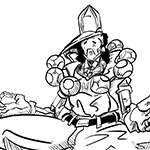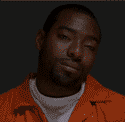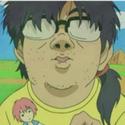|
Xander77 posted:? Yes and no. What you want to do is literally draw off and isolate units and, at the macro level, surround your target cities. This is what I mean by isolating and surrounding. Simply driving a wedge into the enemy to separate his forces isn't enough. The way to look at it is divide and conquer calls for a strong push between two parts of the enemy force so as to separate them from each other and handle them as independent forces rather than as a whole. Isolating and surrounding is pulling much smaller parts away and surrounding them from any support. The game favors isolating individual cities for attack and individual units on the field. Isolated cities can't get reinforcement troops, and isolated units can be attacked in unison by multiple units. Simply driving a wedge doesn't give you the benefit of removing reinforcements or surrounding an enemy. The difference may be minor and the terms may not be the best for what I'm trying to say, but that is what I mean. Also, even though this update was late I'll still put something up tomorrow. But it will be the bonus update I planned for Monday, and the next game-play update will be Monday or Tuesday. I realize I've kinda lost the regularity of my planned updates, but I'll keep trying to get two game-play updates out a week.
|
|
|
|

|
| # ? Apr 26, 2024 18:49 |
|
I picked up Three Kingdoms thanks to this thread. Thanks guys!
|
|
|
|
Bonus Update: Officer Biographies 2 I suppose I'm just asking for Argle to say I'm not being harsh enough, but...  Portrait of Liu Bei from RoTK9 For our second biography we'll take a look at the life of Liu Bei, the first King of Shu and our current liege. To start lets get the description of Liu in Romance. quote:This man was no mere bookish scholar nor found he any pleasure in study. But he was liberal and amiable, albeit a man of few words, hiding all feeling under a calm exterior. He had always cherished a yearning for high emprise and had cultivate the friendship of men of mark. He was tall of stature. His ears were long, the lobes touching his shoulders, and his hands hung down below his knees. His eyes were very prominent, so that he could see backward past his ears. His complexion was clear a jade and he had rich red lips...His name was Liu Pei (Bei), or more commonly Liu Yuan-te (Xuande). So what the heck is going on with Liu's appearance? Well these physical features, which likely poorly describe or significantly exaggerate his actual features, are symbolic or metaphorical. As has been pointed out a bunch in this thread, Luo Guanzhong was writing at a time and with a bias that heavily favored Liu and Shu as the true successors to the Han and saw Cao Cao and his successors, including the later Jin Dynasty, as usurpers. So what do these features mean? Long ear lobes can have several different meanings. The Buddha is depicted as having extraordinarily long ear lobes, a result of the practice of wearing heavy plugs in the ear lobes. As a result, long ear lobes are a sign of virtue in many different Buddhist cultures, denoting patience, wisdom, and the ability to help and to receive help from others. The lobes have taken on other characteristics in more modern interpretations, including a sign of wealth, either moral wealth or monetary wealth. Some view long ear lobes as a sign that a person is a good listener who can hear very well. Prominent eyes have different meanings as well. Some say Liu's eyes let him see through the deceit of those before him (though his track record may suggest otherwise). Others suggest it means he was just very perceptive and could read the situation around him. More likely this trait is simply misinterpreted, since the Records of the Three Kingdoms recounts that Liu's ear lobes were so long he could see them. Romance extends that to mean his eyes were prominent as well as his ears were long. Complexion clear as jade has multiple meanings. First, jade was a symbol of the Imperial authority, and by equating this complexion with jade Luo Guanzhong was trying to further emphasize Liu's connection to the Han Dynasty. Fair complexion is also equated with Buddhist meditation and enlightenment, as well as calm demeanor rather than an explosive temperament. Rich red lips are a distinguishing feature and a sign of beauty in traditional Chinese culture. Now lets stop being so shallow and talk about Liu Bei's life. First of all, Liu Bei has many titles and names referencing his descent from the Imperial lineage. This is because Liu was a descendant of the Prince Sheng of Zhongshan, a great-great-grandson of the Han Emperor Jing. Historian Pei Songzhi, however, claims Xuande was a descendant of the Marquis of Linyi, who would also have been a descendant of the Emperor Jing. He was born in Zhou County, in the Youzhou region of northern China. His branch of the Liu family had lost their title generations before because they failed to pay annual tribute, and so Liu Bei was not wealthy or of much repute until the Yellow Turban Rebellion. His father died while Xuande was young, and as a young man he made money to support himself and his mother by weaving mats and sandals. Xuande was tutored by Lu Zhi, a prominent scholar, where he befriended Gongsun Zan. His education was paid for by a relative (called an 'uncle' in Romance) named Liu Yuanqi. Xuande did not care for studying, a fact pointed out by both Records and Romance, and instead took to hunting and music. At the outbreak of the Yellow Turban Rebellion Xuande called together troops to help fight. Included in his troops were the officers Guan Yu and Zhang Fei. Xuande managed to achieve some martial victories against the Yellow Turbans, which earned him a title in Anxi County. Romance claims Xuande was overlooked by the Imperial administration, but an official named Zhang Jun railed against the Court Eunuchs who looked over the "list of unimportant people" and found Xuande's name, earning him the post at Anxi. A few months later an order was made to reduce military officers holding civil posts. An Imperial inspector came in accordance with the order, and then sources diverge. In Romance the official was corrupt and demanded bribes from Xuande, who would not extract more taxes from the peasants to pay the bribe. When Xuande went to see the inspector to rebut the charges of corruption against him the doorkeepers kept him out. This upset Zhang Fei who was "half intoxicated" (which is pretty much always Zhang Fei's state of being) who dragged the inspector out and beat him with a switch. Xuande stops Zhang Fei from killing the inspector when he hears what is going on, hangs his seals of office around the inspector's neck, and then says "If I hear that you injure the people I will assuredly kill you." Records says when the inspector came to Anxi, Xuande went to see him but was not allowed in. Pei Songzhi claims the inspector was sick. Xuande became angry believing he would have to give up his position and so dragged out the inspector (or ordered his officers to drag him out), tied him to a tree, and beat him two hundred times himself. He then hung the seal around the inspector's neck and left. After leaving Anxi Xuande fell in with local forces putting down a remnant Yellow Turban force. His efforts earned him a new office in Xia Mi, and then in Gaotang. Romance claims that Xuande left his office when Gongsun was making his way to join the Anti-DOng Zhou Coalition and Gongsun called upon Xuande to join him. When the Coalition broke up Xuande was left in charge by Gongsun at Pingyuan. In reality more rebels drove Xuande off, and he sought refuge with his friend Gongsun Zan. Gongsun made Xuande an officer and sent him to help repel Yuan Shao who invaded after the collapse of the Coalition. Xuande helped defend Pingyuan and was made magistrate and then governor of Pingyuan. Records recounts that assassins sent to kill Xuande would not kill him because he was so beloved by everyone in Pingyuan. Thee Wei Shu, written in the third century AD, says Xuande treated the assassins so generously, not knowing their business, they were shamed into leaving. In 194 Cao Cao invaded Xu Province, governed by Tao Qian. Tao was allied with Yuan Shu and Gongsun Zan, who were fighting against Yuan Shao, Cao Cao, and Liu Biao. Tao called upon Liu Bei and Tian Kai for help against Cao. Xuande left to aid Tao Qian, and eventually left Gongsun Zan's service to join with Tao. After Tao died Xuande succeeded him as govenor of Xu Province. There were serious consequences to this, since Yuan Shu wanted control of Xu, and Xuande would be superseding Tao's sons. To secure his position, Xuande switched alliances, joining with Cao and Yuan Shao in exchange for Yuan Shao's confirmation of Xuande's title. In 195 Xuande gave refuge to Lu Bu who had been defeated by Cao Cao. The following year Yuan Shu attacked Xuande with an army under Ji Ling. Xuande lead his army to defend and so was away from his city of Xiapi, leaving Zhang Fei in charge. Romance claims Zhang Fei did not want cause any more problems because of his drinking. But before forbidding alcohol, he held a final banquet. One guest, named Cao Bao, refused to drink any wine at the banquet, which insulted Zhang Fei who beat him. Cao Bao was the father-in-law of Lu Bu. The more historical account is that Cao Bao was a former officer of Tao Qian who asked for Lu Bu's help when Zhang Fei sought to kill him. There is an alternate account that Zhang Fei actually killed Cao Bao, who was the Chancellor of Xiapi, and the city was in a state of confusion. Lu Bu took the opportunity to defeat Zhang Fei who was still drunk and seize Xiapi and the families of Xuande and his men. The disruption gave Yuan Shu the edge he needed to defeat Xuande who had to retreat. With a significant lack of supplies and the capture of his family, Xuande surrendered to Lu Bu, who stationed him as an ally in Xiaopei.However, as Xuande gathered troops Lu Bu feared he would try to retake Xiapi, and drove Xuande out. Xuande fled to Cao Cao in Xuchang. With Cao's help Xuande returned to Xiaopei and began to regain his strength to strike at Lu Bu. However, Lu Bu managed to attack Xuande again and capture his wives. Xuande and Cao brought their forces together and surrounded Lu Bu at Xiapi. They succeeded in isolating Lu Bu and keeping Yuan Shu from joining with him. Lu Bu was captured and executed and Xuande returned to Xuchang with Cao Cao. The Emperor Xian officially recognized Xuande's relation to the Prince of Zhongshan and styled him "Imperial Uncle." Before leaving Xuchang Xuande was given an edict, hidden in an official's girdle, calling upon Xuande to kill Cao Cao. This was followed by a famous scene recounted in Romance and Records. Cao called upon Xuande to join him for a meal. During the meal Cao said that both he and Xuande were the only heroes of the age, and that others like the Yuans were pretenders. This shocked Xuande who dropped his chopsticks. Xuande explained his shock on a sudden and nearby shock of lightning. Xuande was sent by Cao to intercept Yuan Shu, who was moving to join with Yuan Shao and make a force to overcome Cao. While he was on this mission Yuan Shu would die of illness before any combat, and the other conspirators against Cao were found out and executed. Xuande then fled back to Xiaopei and retook Xiapi, where he stationed Guan Yu. Cao personally lead an expedition against Xuande and defeated him, causing Xuande and Zhang Fei to flee. Guan Yu was separated being at Xiapi, and entered Cao's employ. Xuande joined with Yuan Shao. While serving under Yuan Shao Xuande's officers slowly returned to him, including Guan Yu. Having recollected his officers Xuande left for the lands of Liu Biao, claiming he was seeking to make an alliance on Yuan Shao's behalf. Yuan Shao was defeated by Cao before any alliance was formed, and Cao turned south to attack Xuande. Liu Biao gave him protection from Cao, and Xuande was stationed in Xinye. Liu Biao did not trust Xuande, however, and did not give him any important posts. Liu Biao's rule of Jing Provice was, by all accounts, good. As a result many people of high intelligence and repute had come to the relatively peaceful region to escape the wars in the north and east. Xuande sought the aid of such people and was recommended to seek out Zhuge Liang and Pang Tong. In Romance Xuande sought out Zhuge Liang on three separate occasions, but was only able to meet with him on the third visit. More historical sources say it was Zhuge who sought out Liu Bei or that Liu Bei simply called Zhuge to an audience and he offered Xuande his service. The next year Liu Biao became ill and died. In Romance prior to his death Biao asked Xuande to take control of Jing as his successor, which Xuande refused. On his deathbed Biao asked Xuande to, again, take control of the provice, but Xuande promised to aid Biao's son instead. But, as Pei Songzhi says, Liu Biao loved his son and had planned to install him as the successor. However, before Liu Zong, Biao's son, could take power Xuande had already taken control. The Romance version is supported by some other historical sources, while Pei Songzhi's interpretation is accepted by others. Either way, Liu Zong became the Imperial Protector of Jing and surrendered to Cao Cao, while Xuande was actually taking control of the provincial administration. Xuande fled from his post when Cao approached and brought with him some 100,000 civilians. Guan Yu was sent ahead of the slow moving army to secure the armory at Jiangling. Cao wanted to catch Xuande before he could reach Jiangling, and so led his cavalry in light armor in hot pursuit. Eventually Xuande's army was caught at Changban. Xuande was defeated and he and his officers were forced to flee, abandoning many of the civilians and even their own families. In Romance Xuande's wife and son, Liu Shan, were isolated. The warrior Zhao Yun then cut through Cao's men, including general Xiahou En, to rescue them. Xuande's wife commits suicide by jumping in a well so as to not burden Zhao Yun, who carries Liu Shan back to Xuande with the help of Zhang Fei. Xuande's response, as recounted in Romance quote:Yuan-te (Xuande) took the child but threw it aside angrily, saying, "To preserve that suckling I very nearly lost a great captain." Harsh, but Xuande is the same guy credited with saying "Brothers are hands and feet; wives and children are as clothing. You may mend your torn dress, but who can re-attach a lost limb?" Guan Yu reunited with Xuande at Jiangxia, and all the officers and the remaining 10,000 troops, along with Liu Qi, the eldest son of Liu Biao, fled to Xiakou. Xuande then entered into an alliance with Sun Quan to defeat Cao Cao. The Wu forces engaged Cao's Army/Navy at Chibi. Cao's fleet was burnt and he was forced to retreat. Wu forces under Zhou Yu pursued Cao. Xuande moved to retake the southern cities of Jing, nominally to reinstate Liu Qi in the province. The various governors in the region eventually surrendered to Xuande, though not all survived. Liu Qi died shortly after the conquest of Jing, and Xuande took over as Imperial Protector. Fearing Xuande's growing power, Sun Quan sought to marry his sister to Xuande and make him a permanent ally. The two were married, but Xuande did not remain in Wu, instead returning to Jing on the promise to give the province over to Wu later and preparing to move into Yi. In 211 AD, Cao was preparing a campaign against Zhang Lu in Hanzhong. Liu Zhang, who had relied on Hanzhong as the gateway between Yi and Cao's forces, called upon Xuande to help. Xuande agreed, but while he moved into Yi near Hanzhong, he did not attack Zhang Lu. The following year Xuande wrote to Liu Zhang that he could no longer help fight Zhang Lu, but had to help protect Wu. He asked for Liu Zhang to provide troops and supplies to help him, but Zhang gave only a half of what was requested. Xuande is quoted in the Wei Shu, a history written in or about the third century, "We came to protect Yizhou and put in a lot of effort without rest. He (Liu Zhang) is resourceful yet will not reward us. How can he expect us to fight to the death for him?" In reality this was all part of a plan by Pang Tong to take control of Liu Zhang's northern army and to advance on Liu Zhang's capital at Chengdu. Liu Zhang found out about Pang Tong's plan and had one of Xuande's conspirators executed before ordering that all the passes to Chengdu block Xuande's advance. In retaliation Xuande had two of Liu Zhang's officers executed on charges of disrespect. He took the executed officers' troops and began to attack Fucheng. After defeating the officers there Xuande surrounded Liu Zhang's son, Liu Xun, in Luofeng. Pang Tong was killed by a stray arrow and the siege lasted over a year. Xuande surrounded Chengdu and Liu Zhang held on in the city. He was counting on reinforcements from his former enemy Zhang Lu. Zhang Lu's troops were arriving under the command of Ma Chao and Yang Bai. But Ma Chao was convinced to betray Zhang Lu, kill Yang Bai, and join with Liu Bei. Seeing his last hope vanish, Liu Zhang surrendered to Xuande. Xuande became governor of Yi and exiled Liu Zhang. This is where our scenario begins. In 215 AD, Sun Quan sent an ambassador to ask for Jing province to be turned over to him, now that Xuande was in control of Yi. Xuande refused, breaking his oath to Sun Quan. Cao Cao, meanwhile, actually did conquor Hanzhong from Zhang Lu. Xuande decided to make peace with Wu, rather than fight, and so the two forces split Jing province. In 219 AD, Xuande's forces took Hanzhong from Cao, and Xuande declared himself "King of Hanzhong." In that same year Guan Yu was captured by the forces of Wu, who executed him. Incensed Xuande decided to declare war against Wu for vengeance over Guan Yu's death. In 220, Cao Pi became the leader of Wei, deposed Emperor Xian and declared himself Emperor of Cao Wei. In 221, Xuande declared himself Emperor of Shu Han, and declared his intent to carry on the Han Dynasty. In 222 AD Liu Bei lead his troops personally against Sun Quan in an attempt to reclaim Jing province. In the initial portions of the battle against Wu, Zhang Fei was murdered by his own subordinates. Still, Shu forces managed early success and Lu Xun, commander of Wu forces, ordered a retreat and would not engage the invaders. As summer set in, Shu forces camped close together, which were destroyed by a sudden fire attack launched by Lu Xun. Liu Bei was forced to retreat, and before the end of the year Wu and Shu made a truce. In 223 Liu Bei became very ill. He entrusted the state of Shu to Zhuge Liang, the Prime Minister, and Liu Bei died at the age of 63. His body was buried in the Shu capital of Chengdu. In many ways Liu Bei was as Koei and Romance want you to see him. He was charismatic as a leader, able to draw some very capable people to his employ. He was, at times, very humble and a very down to earth person. He was noted and know for his good relations with peasants and his generally tolerant leadership. But that was Liu Bei early on. As time went on the cracks in his facade began to show through in bouts of violence and treachery,. He is certainly not the master of benevolence or the perfectly morally upright character some media show him as, but he certainly wasn't the worst absolute ruler in Chinese history.
|
|
|
|
So Liu Bei's rule of Shu was barely a decade long? Certainly feels longer in story-time. ... In other news, are all the random exclamations officers in the game make unique to the characters/ scenario, or just madlibs stuff with proper names inserted accordingly?
|
|
|
|
Xander77 posted:So Liu Bei's rule of Shu was barely a decade long? Certainly feels longer in story-time. Mostly madlibs style. It gets a little tiring when every officer says the same stupid exclamations one right after another. That's why I cut out most of them. Everyone seems to say "To think I of all people, a failure" when they get captured. With regards to the only a decade as ruler of Shu, remember, Liu Bei was being a commanding officer in one place or another for much longer than that.
|
|
|
|
I thought the original text had some pretty repetitive exclamations too, though in its defence its very hard to keep from being repetitive when you're writing thousands of pages. I know Journey to the west definitely was very, very repetitive in its dialogue.
|
|
|
|
Wow, these strategy battles are surprisingly complex.
|
|
|
|
Lots of capturing involved in these battles. "I've caught you!" "No, I've caught you!" "No, I'VE caught you!" "And I've caught YOU!" "Caught you too!" "HO HO HO, I caught you!"
|
|
|
|
Ancient China, renowned for both its "tag" games and its feuding.
|
|
|
|
FeyerbrandX posted:I thought the original text had some pretty repetitive exclamations too, though in its defence its very hard to keep from being repetitive when you're writing thousands of pages. The ambushes of Cao Cao after Chi Bi is probably the worst... everything happens four times in a row with almost the exact same dialogue.
|
|
|
|
Cangelosi posted:Lots of capturing involved in these battles. Romance of the Kingdoms 8: Thousands dead but we still have each other
|
|
|
|
Millions, according to even conservative interpretations of census records.
|
|
|
|
A century of near constant civil war, rebellions, barbarian incursions, peasant revolts, bloody coups, purges, bandit attacks, famine and disease caused a very dramatic drop in China's population. Even the unification under Jin didn't last long, within just a couple of decades China was divided once more.
|
|
|
|
I wasn't aware of any widespread disease. Was there a big epidemic? You can't believe the census figures though because they say that 70% of China's population disappeared.
|
|
|
|
Arglebargle III posted:I wasn't aware of any widespread disease. Was there a big epidemic? Yellow fever  I spent about a year and a half learning Mandarin (didn't pan out) and I started playing Dynasty Warriors around 6, the more I learn about the RotTK the more engrossing it is. I'm enjoying both the posts in this LP and the historyposts about the shenanigans of the area. I did not know about Liu Shan getting chucked to the side in favor of Zhao Yun before I started reading this.
|
|
|
|
Man, it is strange to read your native country's history / middle school reading material in another language. It's tough telling people apart when their names are all in pinyin.JosephWongKS posted:RotK references
|
|
|
|
Arglebargle III posted:I wasn't aware of any widespread disease. Was there a big epidemic? It's hard to say, however disease did take a big toll on armies. For example, I can't remember which essay it was, but one text I read suggested Cao Cao lost more men to disease than he did to enemy attacks at Chibi. An epidemic struck Sun Quan's army during the second battle for Hefei which caused him to send most of his men away ahead of him so he wouldn't get sick - this resulted in Zhang Liao ambushing him and nearly killing him. There was definately something in the air, water or climate that affected northerners crossing the Yangtze - and vice versa. There are also many examples of disease and famine breaking out amongst the defenders of cities under siege, although there aren't many accounts of the toil on the civilian populations it's pretty easy to believe that if the defending army was starving, the commoners were as well. Natural disasters (especially flooding) also seemed commonplace. There's not much account on what damage this did to civilians, but one can easily extrapolate on it. For example, during the siege of Fancheng the Han River flooded unexpectedly, obliterating the armies of Yu Jin and causing severe damage to the city. Given apparently the Fan-Xiangyang region was something of a bread basket, one can imagine that this unseasonal flashflood caused widespread damage to the local infrastructure. BAsically, the Three Kingdoms era was likely a miserable time if you were a commoner or civilian 
|
|
|
|
dscruffy1 posted:I did not know about Liu Shan getting chucked to the side in favor of Zhao Yun before I started reading this. That's mostly because it's a fictional attempt to justify Liu Shan's "stupidity" i.e. surrendering to Wei in the face of overwhelming force. Zhao Yun didn't fight through Cao Cao's army to rescue him at Changban any more than Zhang Fei held a bridge to give him time. Zhang Fei destroyed a bridge, abandoning any soldiers who remained to Cao Cao's forces. Zhao Yun found Liu Bei's family among the refugees who kept up and walked them over to him, no fighting needed.
|
|
|
|
Jegan posted:That's mostly because it's a fictional attempt to justify Liu Shan's "stupidity" i.e. surrendering to Wei in the face of overwhelming force. Zhao Yun didn't fight through Cao Cao's army to rescue him at Changban any more than Zhang Fei held a bridge to give him time. Zhang Fei destroyed a bridge, abandoning any soldiers who remained to Cao Cao's forces. Zhao Yun found Liu Bei's family among the refugees who kept up and walked them over to him, no fighting needed. There is no romance in your soul. I'll fully admit I haven't read the actual history or the literature but they're both fascinating. The literature is a tale of heroes from a source I don't have a lot of information on and I love me some heroic fiction. The actual history is so different that reading into it based on the knowledge of the literature is a view both into the circumstances of the times and the way things just get wonderfully glossed over through time. Also it's probably one of the few times history wasn't written by the victor, considering how much Liu Bei is talked up and Cao Cao/Sima Yi are talked down. From my perspective (with my small amount of Chinese knowledge) an understanding of why Adou is terminology for an idiot is amazing, along with all the other terminology that crops up out of that time period.
|
|
|
|
dscruffy1 posted:Yellow fever
|
|
|
|
Calax posted:The ambushes of Cao Cao after Chi Bi is probably the worst... everything happens four times in a row with almost the exact same dialogue. To be fair, most of that is Cao Cao going "Well, Zhuge Liang is an idiot. If I were him, I'd have put an ambush here" followed by an ambush. And the last few times his officers start begging him to stop jinxing them. Then he meets Guan Yu and chews on the scenery for a bit.
|
|
|
|
Jegan posted:That's mostly because it's a fictional attempt to justify Liu Shan's "stupidity" i.e. surrendering to Wei in the face of overwhelming force. Zhao Yun didn't fight through Cao Cao's army to rescue him at Changban any more than Zhang Fei held a bridge to give him time. Zhang Fei destroyed a bridge, abandoning any soldiers who remained to Cao Cao's forces. Zhao Yun found Liu Bei's family among the refugees who kept up and walked them over to him, no fighting needed. Well, at least one historical source says Zhao Yun took Liu Shan to Liu Bei on horse back across some amount of ground, along with Lady Mi, Liu Bei's wife. Not saying how far he actually took them. And Zhang Fei also stood at the end of a bridge hurling insults and challenge to Cao's forces...from the near side of the bridge after he destroyed it. When it comes to the fictional account of Changban and the Zhao Yun story, my favorite part is that Lady Mi kills herself, yet it is well documented that she lived on well past the battle.
|
|
|
|
Damnit women, live up to the confucian ideal of femininity
|
|
|
|
Pimpmust posted:Damnit women, live up to the confucian ideal of femininity Now you remind me of mamma Sun's scenes in the 2010 series and I want to watch them again.  My lord, Liu Bei has arrived to a nearby town, and is publicly buying presents for his wedding to your sister. My lord, Liu Bei has arrived to a nearby town, and is publicly buying presents for his wedding to your sister.*slow foreboding footsteps are heard from behind Sun Quan*  Excuse me, my lord, I have urgent business to attend to. Excuse me, my lord, I have urgent business to attend to.*adviser exits stage left*  QUUUUUUUUUUUUUUUUUUUUAAAAAAN! QUUUUUUUUUUUUUUUUUUUUAAAAAAN!
|
|
|
|
Jeek posted:In addition to that, when I was in high school, they included two parts of RotK (borrowing arrows with straw boats and the death of Yang Xiu) as part of the syllabus for Chinese. Still think that Cao Cao is a rad dude though. One of the interesting tidbits I read about the Chinese Revolution was how Mao Zedong was frequently likened to Cao Cao. In response the Communist Party in China made a big, long-term effort to make Cao Cao look better in popular culture after centuries of vilification. This indirect propaganda campaign takes an amusing twist in 1959 when the Defense Minister Peng Denhuai compared himself to Zhang Fei. Mao takes the relative comparisons as implying a confrontational opinion, and subsequently purges Peng Denhuai. Historical Analogies: SERIOUS BUSINESS in China.
|
|
|
|
So how fair is it to compare Romance of the Three Kingdoms to Confederate apologia, as far as its relationship to reality is concerned? And is there any evidence of the century of chaos in China to be found in foreign sources? Unless the silk trade collapsed completely, there should still have been at least some vague word making its way down the trade routes, and it would be fascinating to see what those stories were as distance from the events increased. For that matter, what were the steppe nomads doing in this period? It would seem like the perfect time for raiding all along the frontier, and possibly deeper into China than would have been possible while the Han dynasty was stable.
|
|
|
|
|
The Sandman posted:And is there any evidence of the century of chaos in China to be found in foreign sources? Unless the silk trade collapsed completely, there should still have been at least some vague word making its way down the trade routes, and it would be fascinating to see what those stories were as distance from the events increased. Well during this time period, the Roman Empire was beginning its' decline. I think they'd already lost Mesopotamia. As for the nomads, I think they started pouring in after the Jin Dynasty collapsed. According to Cartoon History of the Universe (don't laugh, it introduced me to this historical period), these nomadic invaders were also responsible for bringing Bhuddism into China.
|
|
|
|
SirPhoebos posted:Well during this time period, the Roman Empire was beginning its' decline. I think they'd already lost Mesopotamia. Well, the start of Romance the novel is during the reign of Marcus Aurelius and ends before Diocletian is even emperor. Not the Golden Age of Roman History, but not really the darkest days. The decline of the Empire was well on the way, but not many average Romans would have noticed it yet. About whether there are sources in the Western world regarding this period, probably not. There aren't too many sources of first hand historical accounts, let alone records of second hand accounts of nations half a world away.
|
|
|
|
Diocletian took the throne immediately after the crisis of the third century. It was the worst crisis that the roman empire ever survived. Rome went through plague economic collapse and major civil wars and split into 3 parts until Aurelian dragged it all back together. The Senate crowned him Restitutor Orbis, Restorer of the World. Diocletian seized the throne a few years after Aurelian was assassinated. So it was a time of huge upheaval in Roman history as well but rome survived another 200 years in the West.
|
|
|
|
Ah, the Three Kingdoms era. Aka, "Meanwhile, in Rome, the 3rd Century Crisis" SpecialK800 posted:Well, the start of Romance the novel is during the reign of Marcus Aurelius and ends before Diocletian is even emperor. Not the Golden Age of Roman History, but not really the darkest days. The decline of the Empire was well on the way, but not many average Romans would have noticed it yet. As Arglebargle stated, No. The 3rd Century Crisis was the darkest days of the Roman Empire, and the reign/death of Marcus Aurelius the end of the era of "The Five Good Emperors", which was the Golden Age of the Empire. Now, the 5th Century was far worse for the Western Empire. I always find interesting that, faced with a worse crisis than the Han ever faced, the Roman Empire endured. But the moment they became similar in organization to the Han in the slightest way… Bam, 200 years later, the Western Empire collapses exactly like the Han did. As for contacts, we do have a record of an embassy from Marcus Aurelius to China in 166AD, and later the Byzantines would steal silk worms from China. But, much like Han records of "Dai Qin" in the far West, the records are… mythical and imagined more than factual. Though the fact that the Han called Rome the "Great[er] China" tickles my Roman sensibilities. Delta Green fucked around with this message at 03:44 on Nov 11, 2014 |
|
|
|
Well as my earlier post about the economy and government of the Han covered, the 2nd century was a steady death spiral. In contrast the 2nd century was Rome's golden age.
|
|
|
|
Whether the 3rd Century Crisis was the darkest days of the Roman Empire is a matter of perspective. The Empire would continue for around another 200 years in the West and for over a millennium in the East (depending on your interpretation of "continue" and your views on the Byzantines). While the Crisis was a horrific time, that doesn't make it the darkest time. Personally I don't believe there is a "darkest time" in a nation's history because the burdens and pains of the people of a nation are all unique. I'm sure Hannibal's success at Cannae was seen as the "darkest times" for some Romans, as the threat to their very existence seemed to march freely around Italy unimpeded by the existing authority. The Civil War and end of the Republic were probably the darkest times for other Romans, as their entire scheme of governance seemed unequal to the task of overcoming the ambitions of a tyrant. The lowest point for the Roman Empire might have been the Year of Five Emperors in 193 where the imperial throne literally passed to two emperors and saw three claimants challenge them in civil war in the same year, bringing a miserable end to the 2nd Century which had been a real high point in history of the Empire. And that leads into the 3rd Century Crisis, which itself can be seen as the lowest point. My only point was the Empire was in decline, but far from dead at the time the Three Kingdoms period came to a close. Maybe I was hyperbolic and to whatever extant I was flat out wrong, but I wasn't aiming to sit and discuss the history of the decline of the Roman Empire, I just wanted to say Rome went on while the Han collapsed and the Three Kingdoms occurred.
|
|
|
|
You know what I would love to see? The 2010 Three Kingdoms series localized by famous producer Sandy Frank.
|
|
|
|
3-3. Home Sweet New Home So last time we succeeded in capturing Xiang Yang from Cao Cao's forces. There are some housekeeping things that need to be done before we begin doing our work for the next season. First is handling the various officers captured from the battle. Decisions regarding these officers is made by the faction ruler, rather than by the Army commander.       First are the liberated officers. Officer who are liberated are released back to their force. In most cases most captured officers are released since there is no penalty for releasing them and you cannot keep them as prisoners.  Next is our only hired officer. Captured officers can be hired instead of released, but it is not common for officers to willingly switch sides after a battle in the game. Officers hired after battle usually have lower loyalty ratings than officers hired in more conventional ways, an so may become spies against you.  Finally are the officers who have been "dealt with." Officers may be executed by the capturing force, rather than hired or released. I'm not entirely sure what drives the AI to decide whether to execute or release officers. Executing officers remove them from the game and so may give you an edge, but executions cause fame and relations penalty.  Thanks to everyone, we have secured victory. The distinguished officers of this war as follows. Thanks to everyone, we have secured victory. The distinguished officers of this war as follows.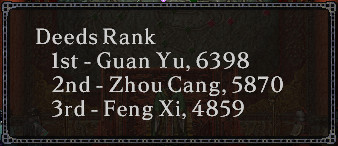 After a battle we get to see who the top three officers in our army were. The Deeds Rank of an officer is increased by dealing damage, destorying units, capturing officers, and capturing the outpost and city.  The 1st deed award goes to me. I am expecting everyone to work harder from now on. The 1st deed award goes to me. I am expecting everyone to work harder from now on.The 2nd deed award goes to Zhou Cang. I am expecting your continued excellence.  Above all, I am pleased to have been of service. Above all, I am pleased to have been of service. Lord Guan Yu, you were spectacular. I must apply myself and ensure I am not beaten. Lord Guan Yu, you were spectacular. I must apply myself and ensure I am not beaten.Being ever so humble, Guan Yu takes top honors and pats himself on the back. Zhou Cang, despite having taken out the enemy commander, gets only second place. And Feng Xi, who did...stuff in the battle gets third place. Second place always gets to say something about being honored and third place either mumbles their disappointment about getting third or praise for the others.  That is the end of the commendations. Let us combine our strengths and take victory again next time. That is the end of the commendations. Let us combine our strengths and take victory again next time.There is still some government organizing that needs to be done. Since we commanded the battle and are a Prefect or higher, our governing city changes to the newly captured city. So we have moved to Xiang Yang and taken only those officers who were in the battle plus any officers hired after the battle. Officers on our side who were captured and released in battle, or who were driven off the battlefield are sent back to the home city, so aren't available to us this season. 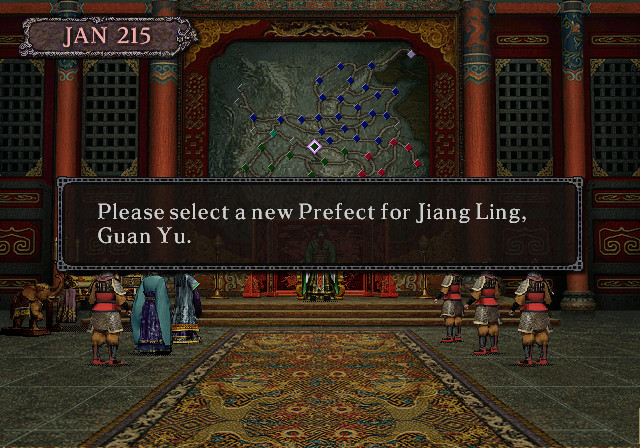 And since we aren't in Jiang Ling anymore, someone else will have to take the reigns there. 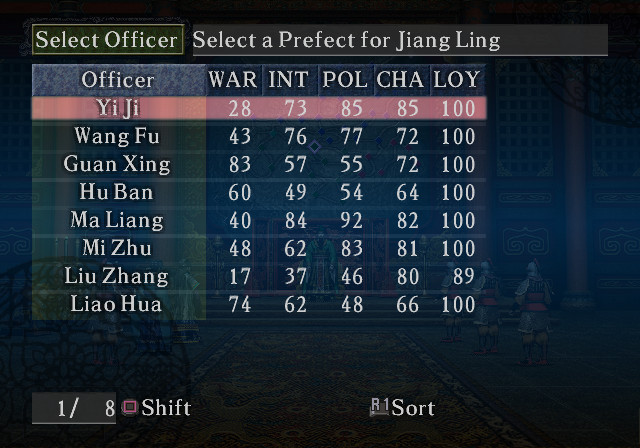 So how do we select the best Prefect? The secret is it doesn't really matter. More important than the actual Prefect choice is who you leave to help them work the city. In this case, even though he would be a fairly helpful officer to keep working, we pick Yi Ji to be the Prefect since next season we'll be shaking things up in Jiang Ling anyway.   Now, let us begin the evaluation. Now, let us begin the evaluation.Since we didn't assign any work in Xiang Yang there is no report to read.  Now it is time to assign the work. Any suggestions? Now it is time to assign the work. Any suggestions?And since we just conquered the city we can't do anything else in terms of Strategy Council actions. That means for this season we're stuck with only a very few officers. 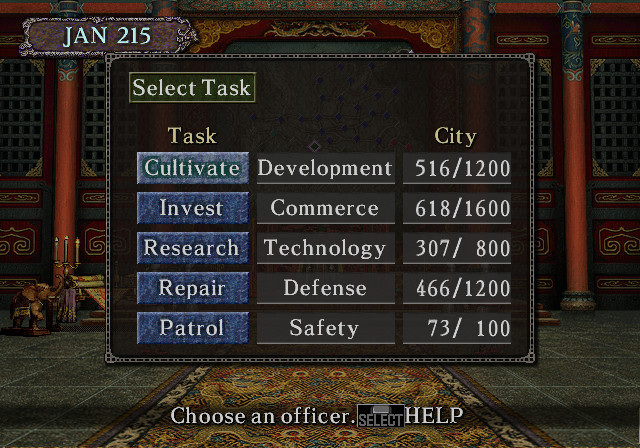 Here's a quick look at the current stats of Xiang Yang. Safety is low, and every stat is below half strength.  So we assign several officers to Patrol to raise safety and put one officer on Cultivate to get that stat improving.  We have a visitor: our son Guan Xing came all the way from Jiang Ling to see us.  I was hoping to see you in person Father, so I decided to come by. I would like to learn Firearrow. I would be ever so grateful if you could teach it to me. I was hoping to see you in person Father, so I decided to come by. I would like to learn Firearrow. I would be ever so grateful if you could teach it to me. This is how officers learn skills for battle. Once an officer's stats are high enough they can repeatedly visit an officer with the skill they want to learn until that officer teaches it to them.  Very well. Listen carefully. When using fire arrows, be swift and don't allow the enemy to extinguish the flames. Consider the direction of the wind, and shoot enemy units to keep them from escaping. Hmm, you still don't get it? We'll go over it again the next time. Very well. Listen carefully. When using fire arrows, be swift and don't allow the enemy to extinguish the flames. Consider the direction of the wind, and shoot enemy units to keep them from escaping. Hmm, you still don't get it? We'll go over it again the next time.So Guan Xing doesn't learn Firearrow, but we do hear some tips about using that skill in battle. Now we need to decide our actions for the season. Since we are in a new city we should check out all the facilities for free officers. Some officers in the game are unaffiliated with any faction, these are Free Officers. They move around the map and are hidden in one of the facilities within their current city. Multiple Free Officers can be hiding in a single city and even in the same facility. So we start our rounds of Xiang Yang. 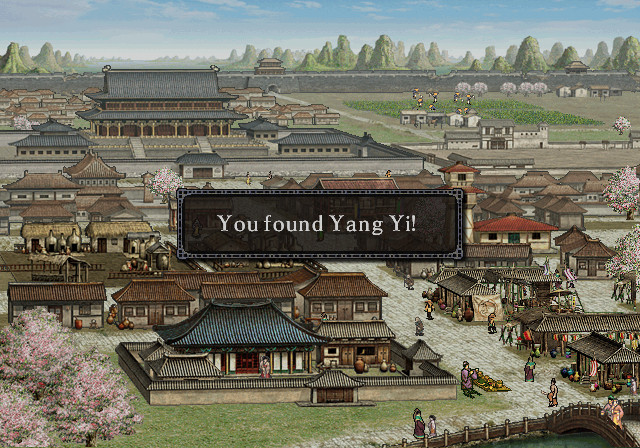 We stubble upon Yang Yi... 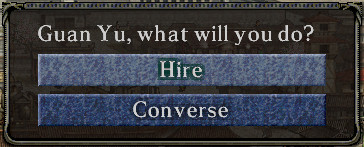 ...and are given the option to either talk with him or try to hire him. Since we're marching into Cao's territory we'll start stretching our officers thin if we don't get some new officers. So of course we'll try to Hire.  Lord Yang Yi. I am pleased to meet you. My name is Guan Yu, servant of His Excellency, Liu Bei. Lord Yang Yi. I am pleased to meet you. My name is Guan Yu, servant of His Excellency, Liu Bei.  Lord Yang Yi, I would like to ask you for your aid. How about it? Will you aid my lord, Liu Bei? Lord Yang Yi, I would like to ask you for your aid. How about it? Will you aid my lord, Liu Bei? I've been unhappy with my treatment lately. Yes, I will accept. I've been unhappy with my treatment lately. Yes, I will accept. Brother, I have brought Yang Yi. Please accept him into our Force. Brother, I have brought Yang Yi. Please accept him into our Force. I have no talent to speak of, but if you find favor in me, I would be honored to serve you. I have no talent to speak of, but if you find favor in me, I would be honored to serve you. I am happy you have come to me, Lord Yang Yi. I am happy you have come to me, Lord Yang Yi. Although I am but one, I will give you my utmost. Although I am but one, I will give you my utmost. And now we have a new officer to help us take over China. But is Yang Yi helpful, or will he just be a sink of our resources? Lets check his stats. 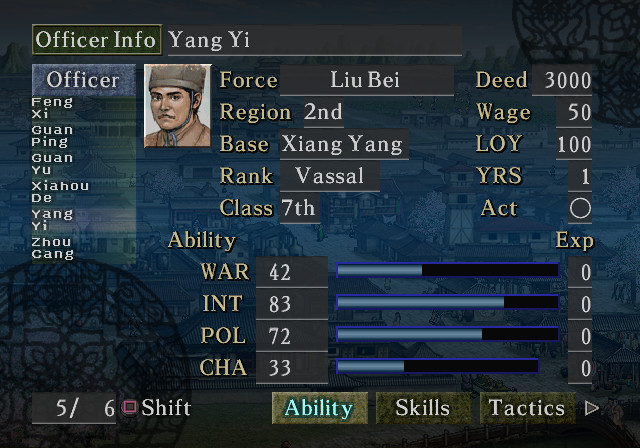 So Yang Yi has above average Intelligence and Politics, meaning he will be a useful domestic officer. But his low War will keep him from the battlefield. We keep searching the city, but find no other officers. Instead, we are approached by an Old man.  We are starving and have no money for food. Please be merciful on us! We are starving and have no money for food. Please be merciful on us!  That's a pity... Here, use this to fill your stomachs. That's a pity... Here, use this to fill your stomachs.  And so we pay a pitance to get some Fame. A nice little flavor event. But once we finish searching we still have half the season to go. Since we have won a victory and acquired two new officers to our force, maybe it's time to throw a little party. 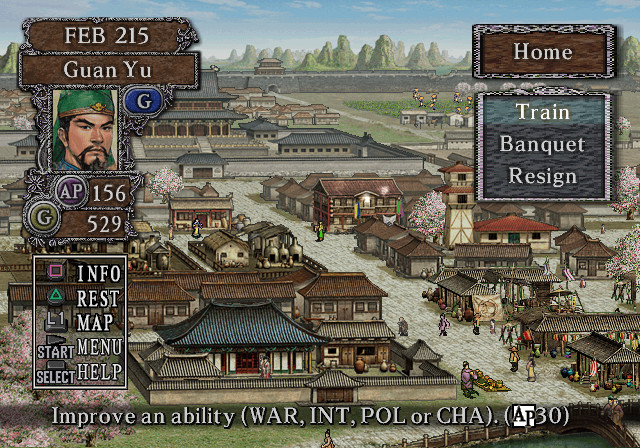 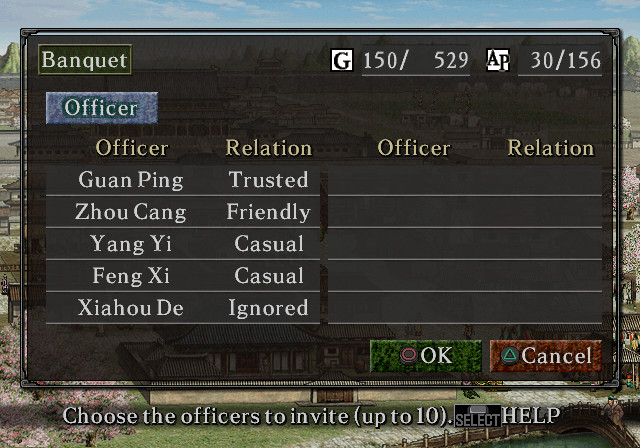 So under our Home menu there is the option Banquet. We select it and then get a screen to invite officers in our city to the party. We invite everyone since it's kinda lonely here in Xiang Yang. This screen also gives us a reminder of the relationship level we have with our officers. The newly recruited Yang Yi already has a Casual relationship with us, while Xiahou De, who we recruited from Cao's forces, feels Ignored. This banquet will help us boost those relations.  Let us enjoy the brilliant peach trees in bloom over some of the finest food in the land. What say you? Let us enjoy the brilliant peach trees in bloom over some of the finest food in the land. What say you?  Thank you all for coming. Enjoy yourselves to the fullest! Thank you all for coming. Enjoy yourselves to the fullest! Lord Guan Yu, I am honored to have been invited here today. Actually, Wang Ping of Chang An showed great interest in coming, so I brought him with me. Lord Guan Yu, I am honored to have been invited here today. Actually, Wang Ping of Chang An showed great interest in coming, so I brought him with me.  I do believe this is the first time we have met. Thank you for coming. Please, join in the festivities. I do believe this is the first time we have met. Thank you for coming. Please, join in the festivities.  So we have a successful banquet and our relations get a boost. We spend the rest of the season helping out with the work in the city and nothing of note happens. We hit the end of the season and get our regular bandit update. 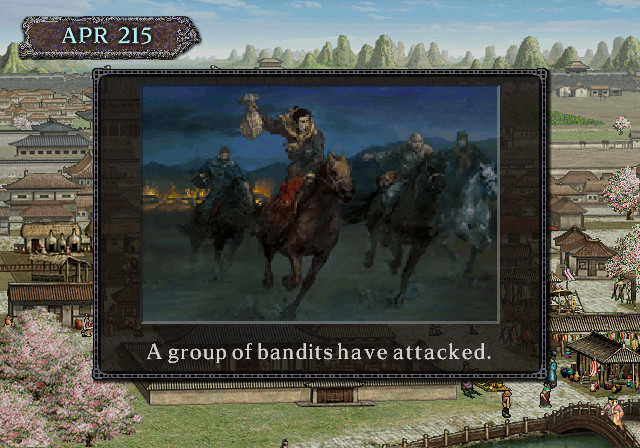 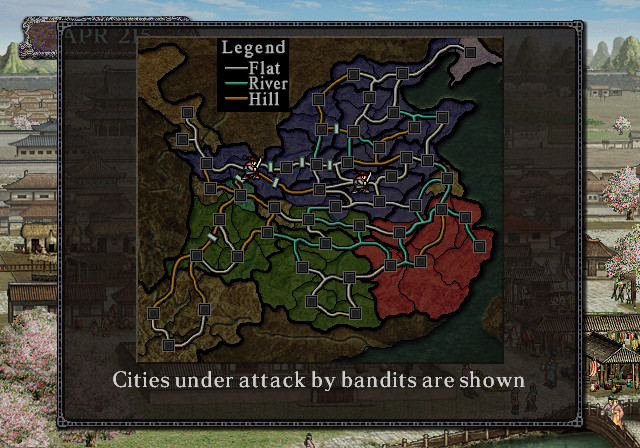 No other events occur this season.
|
|
|
|
Ah great, you got that prick Yang Yi. What an rear end in a top hat. I vote we honour his talent by sending him on a solo invasion of Xinye.
|
|
|
|
Brony Hunter posted:Ah great, you got that prick Yang Yi. What an rear end in a top hat. I vote we honour his talent by sending him on a solo invasion of Xinye. Yeah, Yang Yi was (historically) an rear end in a top hat. But his worst affronts didn't occur until after where we are now. We can use him for helping to fix up the cities we're going to take. If he, somehow, becomes a problem, we can always ship him off to Liu Bei to deal with. I'm sorry I meant send him to Liu Bei to "deal with."
|
|
|
|
Beijing is clearly the 4th rome
|
|
|
|
Is there a finite number of officers? Can the game run out if you're overenthusiastic about' dealing with' officers?
|
|
|
|
Rockopolis posted:Is there a finite number of officers? Can the game run out if you're overenthusiastic about' dealing with' officers? More officers "come of age" every year, there is a finite number but it's in the hundreds. I think a force does get destroyed if all it's officers do die, but I've never seen it happening myself.
|
|
|
|

|
| # ? Apr 26, 2024 18:49 |
|
Which city do the released officers go to? Their home city are captured.
|
|
|




